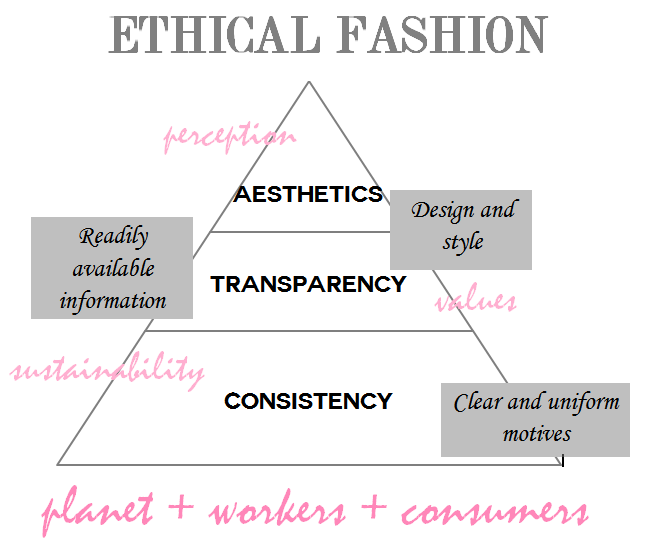These concepts are often used interchangeably to refer to the new wave of apparel manufacturing that wants to fight the business model known as fast fashion. Here, we attempt to shed some light on both concepts and their use by retailers and the media.
Ethical and Sustainable Fashion
Although there can’t be a unanimous definition of anything “ethical”, since such evaluation depends on a personal assessment of what constitutes a morally acceptable behavior, many insist in attaching the word to anything related to human rights in the workplace and working conditions. Ethical fashion, thus, would be anything made under these standards. Similarly, people define sustainable fashion as a separate category where the methods and processes used are less polluting or help decrease the environmental impact of garment production. But a more holistic concept inside the slow fashion movement is that of ethical everything, from environmental considerations to labor rights and supply chain transparency.
Fashionhedge’s assessment of ethical fashion goes more along that extended concept, but we acknowledge that to deem anything as “ethical” comes with a series of implicit values, cultural perceptions and extremely subjective points of view; that is why we believe it’s the consumer’s job to judge if something is ethical or not. These are some features that are usually pointed out as ethical:
- Fair trade
- Employing women or certain ethnic groups
- Made without animal components
- No animal testing
- Donating part of the profits to a charity
- Made in a developed country
- Handmade
- Fair wages paid
- Contributing to preserve traditions of an ethnic minority
- Revealing manufacturing locations and workforce policies
- The product itself rises awareness or promotes an ideal or cause
Whether you consider those features ethical or not, depends on your personal views, hence, all the manufacturer can do is clearly state their special features and motives, but for the most part, it is in the consumer’s end to judge the credibility of a company and decide if any of such features deserves a price premium or a preference on their part.
Here are some features frequently cited when describing sustainable fashion:
- Made with organic fibers, sometimes certified by an international body like GOTS or USDA
- Made with more eco friendly fabrics, like hemp or bamboo (which need less chemicals and/or water to be grown)
- Natural origin of the dyes
- Use of discarded fabrics
- Upcycling of used materials
- Made with recycled fabrics
- Use of less toxic glues
- Garments made to last for a long time
For us, transparency is at the core of anything we can value as ethical, so we put a high weight into how easy is it to find out any of the above features about a product. And, as we have discussed before, slow fashion , no matter what, has to be well designed and aesthetics cannot be relegated to a secondary stage when it comes to fashion. There is where we find most of the inconsistencies in ethical fashion that have caused people to not care about it.
A new approach to ethical fashion
Being more ethical as a consumer when it comes to fashion also means changing simple behaviors and not buying new clothes, as some retailers want to make you believe. Getting the most out of the garments you already have, using less polluting detergents and finding new uses for seemingly obsolete pieces also helps the environment, as you demand less clothes per unit of time.
Our ethics pyramid looks like this:

Aesthetics comes first because you don’t help anyone if your product is not desirable. Transparency means that the company has at least thought about aspects like sourcing and human rights enough to state in on the website or to provide clear information via email, social channels or phone. Consistency is a nice word for “no BS”; a company’s marketing story and actions must be congruent, you can’t talk about commitment to sustainability, for example, and then continue to utilize “traditional” manufacturing methods for the majority of your operations, making only a couple “eco-friendly” shirts to shut the tree huggers up.
What the experts say
The Ethical Fashion Forum defines ethical fashion in this broader way, in which environment and working conditions are contemplated:
For the EFF, ethical fashion represents an approach to the design, sourcing and manufacture of clothing which maximises benefits to people and communities while minimizing impact on the environment.
People in the industry gave us their own definition of the term:
I think the term ethical is open to interpretation, as my ethics are likely different from yours, and highly personal. I tend to use the term sustainable when I am asked for definitions, as it is a definable term, and not a personal interpretation. Sustainable means something that does not deplete through material extraction, does not exhaust through production and does not pollute through either of the above, and can act as the raw materials for a new product when it reaches the end of its life. Basically a circular economy of cradle to cradle production.
Sass Brown – Fashion designer and activist
Ethical fashion is a production process that does not impact negatively on the environment or on the people involved in the production. It encompasses a sense of social responsibility which relates to
-
the materials used and the environment where they are produced
-
the people involved in the production who are guaranteed a fair wage and good working conditions
-
the consumers who purchase goods that are lasting and well made
Eva Power – The Ethical Silk Company
For me ethical fashion is not so much about immediate practices but the moral nature of those driving decisions in the industry. It is about an outlook and mindset; if those in positions of power who make critical decisions are responsible and moral in their beliefs, then the practices follow logically.
Michael Lavergne – Supply Chain Professional and Author
Conclusion
Ethical is whatever you want it to be, and we believe it’s important to have this conversation because there are some people using fear techniques to make you buy things. Even if such strategies have good intentions in some level, incomplete, biased and incorrect information deliberately passed onto consumers should never be the standard. You have the power to decide what to buy and what causes to support and, in our opinion, the best way to be an ethical consumer is to have as much information as possible.
